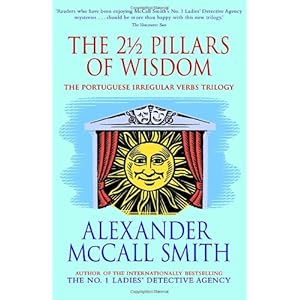
Exercises in Style by Raymond Queneau
Calder Publications, 1998
So there's this guy named Raymond Queneau, right, and one day he decides to write the same little scene (i.e. a man is jostled by another man on the bus and they argue, then the first man goes and sits down; later on the narrator spots him being questioned by a friend about his fashion sense) in ten different styles. He sends the completed work in to a literary magazine and the editor looks at it and is puzzled and sends it back. Then the guy writes 89 more variations of his story and at some point the whole thing gets published.
It's a simple and somewhat strange concept. But the fantastic thing is that it illustrates just how much diction, subjectivity and tone really matter in language. Just by using appropriate synonyms and adding some exclamation points here and there, a sombre description of the scenario evolves into what could pretty much be an extract from a lighthearted gossip session. Each time, the same scene is retold from a different angle, with a different hook (without the letter 'e', as a tanka...). It's a charming exploration of the nuances that a mastery of language - French, in the original; and English in the edition I read (of course) - can afford.
Having read this, I've come away with an overwhelming appreciation for the art of translation. The edition I read includes a foreword written by the translator Barbara Wright, a foreword in which she describes the painstaking effort put into approximating the tones of each original snippet. In many cases for which there are simply no equivalent jokes or words in English, she had to craft similarly contextualized scenarios from scratch at her own discretion. With this in mind, the final English language work, while certainly based on the premise introduced by Queneau in the original French, is probably as much Wright's work as his. It did make me wonder how different the English translation is from the French original - but I suppose, not being a Francophone and not really knowing much about French culture in general, it's not likely that I'll be able to find out any time soon. Which is kind of a shame.
All that said, though, no matter how interesting its premise, you really can't escape from the fact that Exercises in Style is basically 99 slight variations of the same short and not particularly meaningful story. I have no doubt that the scene to which the reader is repeatedly subjected is in fact intended to be meaningless on its own; the overall focus of the book is supposed to be on the various forms through which the story is told, rather than on the story itself. But it's kind of like in Whose Line is it Anyway?, when the improvisers were asked to read the credits out in an 'amusing' style of Drew's (or, indeed, Clive's) choosing - it's funny at first, but after the nth time it just gets a little bit old. After I got the point it was trying to make about the flexibility and fluidity of language, I found it quite difficult to go on reading for more than a few chapters at a time.
Because of this last point, I'm giving Exercises in Style 3.5 stars. It's an intriguing idea that gets slightly tedious after a bit, but I can't say I regret checking it out.
I'd actually wanted to read this book for a while now. It was briefly featured in a book I read last year, Important Artifacts and Personal Property From the Collection of Lenore Doolan and Harold Morris, Including Books, Street Fashion and Jewelry by Leanne Shapton (I love typing that out in full), which I reviewed some time ago. At the time I figured that the two books were somehow linked, in spirit, both being concerned with the retelling of everyday stories in unique styles. The thing is, Important Artifacts worked for me because the story was one I enjoyed and could invest in; Exercises in Style not so much, because of the mundanity of the basic story. I think I'm just fundamentally a story person.













